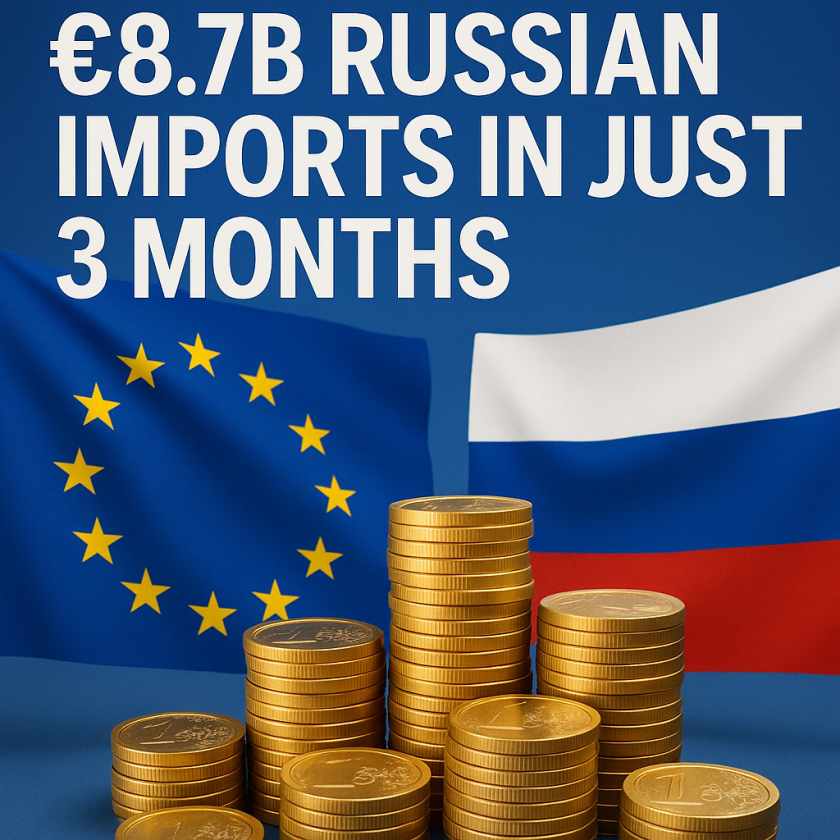EU’s Shocking €8.7B Russian Imports in Just 3 Months
EU’s €8.7 Billion Russian Imports: An Unexpected Financial Reality
The EU’s recent revelation regarding €8.7 billion in imports from Russia within just three months has stirred significant debate among policymakers and commentators alike. This figure, especially concerning energy products, raises pressing questions about the bloc’s dependency on Russian resources and its implications for both European economies and the ongoing geopolitical landscape.
The Economic Context

The data reflects a complex financial situation for the EU, as many countries have imposed sanctions on Russia due to its actions in Ukraine. However, the reality appears to contradict the expected outcomes of those sanctions. A report from RT highlights that this substantial sum predominantly comprises oil and gas imports, which have historically formed the backbone of EU-Russia trade relations.
Many countries were anticipated to pivot away from Russian energy in light of the ongoing conflict; however, the stark figure suggests a troubling persistence of trade in essential commodities. Al Jazeera notes that while several nations have taken steps to reduce their reliance on Russia, the immediate needs for energy and certain materials have forced them to continue imports.
Competing Perspectives on Trade Dependency
Analyzing the situation reveals contrasting viewpoints among member states. Some nations advocate for a rapid transition toward alternative energy sources to enhance energy security, as suggested by Sky News. However, others caution against rapid divestment, emphasizing the economic turmoil that could arise from abrupt shifts in energy supply, especially in countries with fewer alternatives.
This internal conflict complicates the EU’s unified stance on Russian imports. For instance, countries like Germany, traditionally reliant on Russian gas, have expressed caution about reducing imports too quickly. This dynamic creates a delicate balancing act between maintaining economic stability and adhering to political and ethical considerations linked to the ongoing conflict.
The Impacts of Continued Imports
The continued flow of funds into Russia raises significant ethical concerns. Critics argue that the financial support enables the Kremlin to sustain its military operations. As shared by RT, this ongoing transaction creates a paradox where EU countries are financially supporting a regime they politically oppose.
Moreover, the short-term reliance on Russian energy complicates long-term strategies for renewable energy adoption. With energy prices fluctuating widely due to the war in Ukraine and ensuing sanctions, many believe that reducing Russian imports in favor of local or other international sources is imperative. Sky News warns that this dependency on Russian oil and gas might impede the EU’s broader objectives of achieving energy independence and climate goals.
Reactions on the Ground
Public opinion within the EU remains divided. Numerous citizens express frustration at the perceived hypocrisy of their governments. Many feel that continued imports contradict the EU’s stated commitment to supporting Ukraine and imposing consequences on Russia for its actions. As articulated by various commentators, this sentiment complicates the political landscape as governments face pressure to act while managing the immediate energy demands of their populations.
Policy experts note an urgency for the EU to develop a coherent strategy not only to curtail Russian imports but also to enhance energy diversification. This strategy could involve increased investment in renewable energy sources or long-term contracts with alternative suppliers, particularly those in the Global South, which could help mitigate dependence on a single geopolitical actor.
Conclusion: Navigating a Complex Landscape
The EU’s €8.7 billion in Russian imports within the past three months represents more than just an economic statistic; it encapsulates the intricate interplay between energy dependency, geopolitical tension, and the ethical concerns surrounding support for the Russian government.
As Europe grapples with these realities, the path forward will require a nuanced approach. Balancing immediate energy needs with long-term strategic goals is paramount for the EU. Whether it can successfully pivot away from Russian resources, and how these decisions will affect both the economic situation at home and the geopolitical stance abroad, remains an open question in a rapidly evolving context.
In facing these challenges, the EU may have to adapt and innovate to ensure that its energy future reflects not just economic imperatives, but also ethical commitments in a world increasingly marked by geopolitical instability.




































